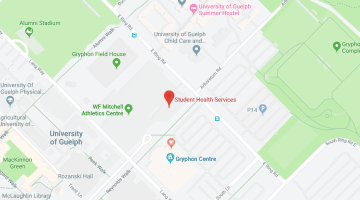Not sure how to respond a student in distress? Follow the "Three Rs: Recognize, Respond, Refer"
RECOGNIZE
RECOGNIZE indicators that someone may be experiencing mental health concerns.
Indicators of Distress:
Thoughts:
- Fearful
- Obvious confusion
- Statements of hopelessness or helplessness
- Overt references to suicide or threats of harm to others
- Extreme and repeated suspiciousness, paranoia
Feelings:
- High levels of nervousness and worry
- Decreased motivation, lethargic
- Feeling lonely, isolated, misunderstood, or worthless
- Extreme mood swings or persistent low mood
- Agitation, restlessness, or hyperactivity
- Unusual emotional reactions (e.g., inappropriate anger, crying, giggling) or being inexpressive/devoid of emotion
Actions:
- Behaviour that is a significant and persistent change from usual behaviour
- Isolating self from others. Little or no participation in activities they once enjoyed
- Significant problems with roommates, friends, or family
- Deterioration in personal hygiene. Sudden, unexplained weight gain or loss
- Frequent requests to talk/meet with you or other support persons in private
- Repeated hostile, sarcastic, or inappropriate remarks
Academics:
- Frequently missing classes and not handing in academic work
- Increased difficulty or inability to concentrate
- Written work that includes emotional outbursts, self-loathing, hopelessness, or disorganized thinking
- Avoiding classes when presenting or participation is expected
- Aggressive or disruptive behaviour in class
RESPOND
RESPOND appropriately to someone who needs support, based on the indicators present and your relationship with them. For more information, view our recommendations for Responding To Students In Distress: For Staff & Faculty [1]
Strategies for Interaction with Students in Distress:
- Respect their right to privacy
- Be direct and specific
- Listen actively
- Avoid giving immediate advice
- Instill a sense of hope
- Maintain appropriate boundaries
Helpful Strategies to respond:
- Express concern: “I’m concerned about X. I wonder if we could talk about X.
- Refer to specific behaviours or patterns of behaviour: “I’ve noticed you are ….[behaviour] and it seems like you…[emotion]. Is everything okay?”
- Provide room for disagreement: “I may be wrong, but…”
- Listen, acknowledge, and reflect: “I hear that you are….what will help you right now?”
- Acknowledge their courage in disclosing a personal difficulty: “I know that talking has been difficult, but it’s good that we talked.”
If you’re not comfortable approaching the student or have concerns about the degree of risk see resources that you can contact for support.
For more information, view our recommendations for Responding To Students In Distress: For Staff & Faculty [1]
REFER
REFER someone to mental health supports and services in an appropriate way; and
- Encourage a student to seek support by offering resources
- If a student seems reluctant you can help by: offering to contact the resource on their behalf while they are in your office or offer to sit with them while they make contact
- If you are reaching out on the students behalf, please ensure you have their consent to do so and that they are aware someone will be contacting them.
When a Student says “no” to a referral:
You may have made a decision to refer a student for very good reason, only to have the student refuse to see a counsellor. Except in cases of clear emergency, respect the student's right to accept or refuse counselling. If it is not an emergency, it is important to give the student some time to think things over. If you have time to meet again you can share your concerns and reasons once more. If a student wishes to continue to talk to you, then consider your own personal limits with respect to your energy and ability to help.
